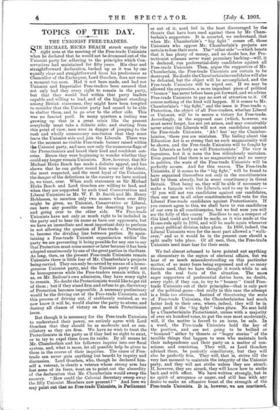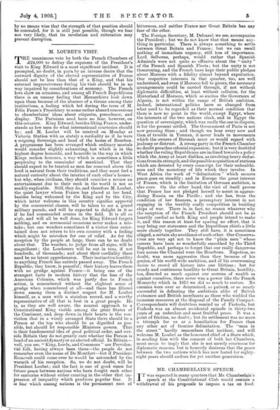TOPICS OF THE DAY.
THE UNIONIST FREE-TRADERS.
SIR MICHAEL HICKS BEACH struck exactly the right note at the meeting of the Free-trade Unionists when he declared that he would not be drummed out of. the Unionist party for adhering to the principles which Con- servatives had maintained for fifty years. His clear and straightforward declaration, backed up as it was by one equally clear and straightforward from his predecessor as Chancellor of the Exchequer, Lord Goschen, does not come a moment too soon. Had it not been made, and had not Unionist and Imperialist Free-traders been assured that not only had they every right to remain in the party, ' but that they would find within that party leaders capable and willing to lead, and of the highest standing among British statesmen, they might have been tempted to consider that the Unionist party had ceased to be able to shelter them, and to go over to the other side. This was no fancied peril. In many quarters a feeling was growing up that in a great crisis like the present everybody must take a definite side; and starting from this point of view, men were in danger of jumping to the rash and wholly unnecessary conclusion that they must leave the Unionist side and join the Liberals. There was for the moment no visible Free-trade banner raised within the Unionist party, and men saw only the numerous flags of the Protectionists and heard their loud and confident out- cries. Hence they were beginning to wonder whether they could any longer remain Unionists. Now, however, that Sir Michael Hicks Beach has made a definite appeal, and has shown that he can gather round him some of the ablest, the most respected, and the most loyal of the Unionists, the danger of the defections in the country we have noticed is, we trust, over. When such statesmen as Sir Michael Hicks Beach and Lord Goschen are willing to lead, and when they are supported by such tried Conservatives and Liberal Unionists as Mr. W. F. D. Smith and Mr. Henry Hobhouse, to mention only two names where over fifty might be given, no Unionist, Conservative or Liberal, can have any possible excuse for deserting his party and going over to the other side. We Free-trade Unionists have not only as much right to be included in the party and to bear its name as have our opponents, but we have an immediate and most important duty to perform in not allowing the question of Free-trade v. Protection to become the dividing line between parties. By main- taining a Free-trade Unionist organisation within ' the party we are preventing it being possible for any one to say that Protection must come sooner or later because it has been adopted unanimously by one of the greatparties in the State. As long, then, as the present Free-trade Unionists remain Unionists there is little fear of Mr. Chamberlain's projects being carried. They can only be carried by means of a homo- geneous Unionist party, and the Unionist party will not be homogeneous while the Free-traders remain within it, as, on Mr. Balfour's own admission, they have every right to remain. No doubt the Protectionists would like to get rid of them ; but if they stand firm and refuse to go, the victory . of Protection becomes impossible. A necessary preliminary would be the driving out of the Free-trade Unionists, and this process of driving out, if stubbornly resisted, as we now know it will be, would shatter the party to atoms, and destroy all chance of victory on the main Protectionist issue.
But though it is necessary for the Free-trade Unionists to understand their power, we entirely agree with Lord Goschen that they should be as moderate and as con- ciliatory as they are firm. We have no wish to treat the Protectionists in the party as if they had no right to exist, or to try to expel them from its ranks. By all means let Mr. Chamberlain and his followers inquire into our fiscal system, and, what is more, let all possible help be given to them in the course of their inquiries. The cause of Free- trade can never gain anything but benefit by inquiry and discussion. Lord Goschen, who, though he declared him- self a veteran, is clearly a veteran whose strong arm has lost none of its force, went on to point out the absurdity of the declaration that Mr. Chamberlain would sweep the country. "How could the Colonial Secretary sweep away the fifty Unionist Members now present ? " And here we may point out that no Free-trade 'Unionists, in Parliament or out of it, need feel in the least discouraged by the threats that have been used against them by Mr. Cham- berlain's supporters. It is asserted, we understand, that when Mr. Chamberlain's "big fight" comes off, those Unionists who oppose Mr. Chamberlain's projects are certain to lose their seats. The" other side "—which boasts that it has plenty of money, and no doubt has, for Pro- tectionist schemes never want pecuniary backing—will, it is declared, run preferential-duty candidates against all Free-trade Unionists. Then, argue the supporters of Mr. Chamberlain, the Free-trade Unionists are certain to be destroyed. No doubt the Chamberlainite candidates will also be defeated, but the object will be accomplished, and the Free-trade Unionists will be wiped out. If we may be allowed the expression, a more impudent piece of political "bounce " has never before been put forward, and we advise Free-trade Unionists to pay no sort of attention to it. Of course nothing of the kind will happen. If it comes to Mr. Chamberlain's "big fight," and the issue is Free-trade v. Protection, the object of all Free-traders, whether Liberal or Unionist, will be to secure a victory for Free-trade. Accordingly, in the supposed ease (which, however, we must never forget, has not yet arisen, and may conceivably never arise) the Liberals will not run candidates against the Free-trade Unionists. 'Ah! but 'say the Chamber- lainites, there you are mistaken. The feeling about the Education Act is so strong that no such magnanimity will be shown, and the Free-trade Unionists will be fought by the Liberals as hotly as will Protectionists.' The view is ingenious, but it is none the less ridiculously mistaken. Even granted that there is no magnanimity and no mercy in politics, the seats of the Free-trade Unionists will be perfectly secure. And for this reason. The Free-trade Unionists, if it comes to the "big fight," will be found to have organised themselves not only in the constituencies held by them already, but in every constituency in Great Britain. That being so, they will be able if necessary to make a bargain with the Liberals, and to say to them:— 'If you will not run candidates against our candidates, then our men in all other constituencies will vote for the Liberal Free-trade candidates against Protectionists. If you cannot agree to this, we shall have to run candidates of our own in all constituencies, but we feel sure you will see the folly of this course.' Needless to say, a compact of this kind could and would be made, as it was made at the Home-rule split in 1886, and will be made again whenever a great political division takes place. In 1886, indeed, the Liberal Unionists were for the most part allowed a "walk- over," and so it would be in the present case should a split really take place. Of all men, then, the Free-trade Unionists need least fear for their seats.
We feel almost ashamed to have pointed out anything so elementary in the region of electoral affairs, but we hear of so much misunderstanding on this particular matter, of so many fears being expressed and of so many threats used, that we have thought it worth while to set forth the real facts of the situation. The more eager supporters of preferential duties have, no doubt, every right, if they can, to try to " bounce " timid Free- trade Unionists out of their principles—that is only part of the political game—but really in this case the attempt is a little too obvious. Instead of threatening the seats of Free-trade Unionists, the Chamberlainites had much better look to their own, where, indeed, they will be in great peril if the "big fight" takes place. No seat held by a Chamberlainite Protectionist, unless with a majority of over six hundred votes, to put the case most moderately, will, if the matter is forced to an issue, be safe. In a word, the Free-trade Unionists hold the key of the position, and are not, going to be bullied or " bounced " either by threats or "bogey stories" of the terrible things that happen to men who maintain both their independence and their party on a matter of con- science and conviction. They will, as Lord Goschen advised them, be perfectly conciliatory, but they will also be perfectly firm. They will, that is, strive till the very last moment to maintain the integrity of the Unionist party, and they will not strike unless they are struck. lf, however, they are struck, they will know how to strike back and with effect. We have written strongly, but in no spirit of arrogance or anger, and still less with any desire to make an offensive boast of the strength of the Free-trade Unionists. It is, however, we are convinced, by no means wise that the strength of that position should ...be concealed, for it is still just possible, though we fear not very likely, that its revelation and reiteration may prevent disruption.











































 Previous page
Previous page